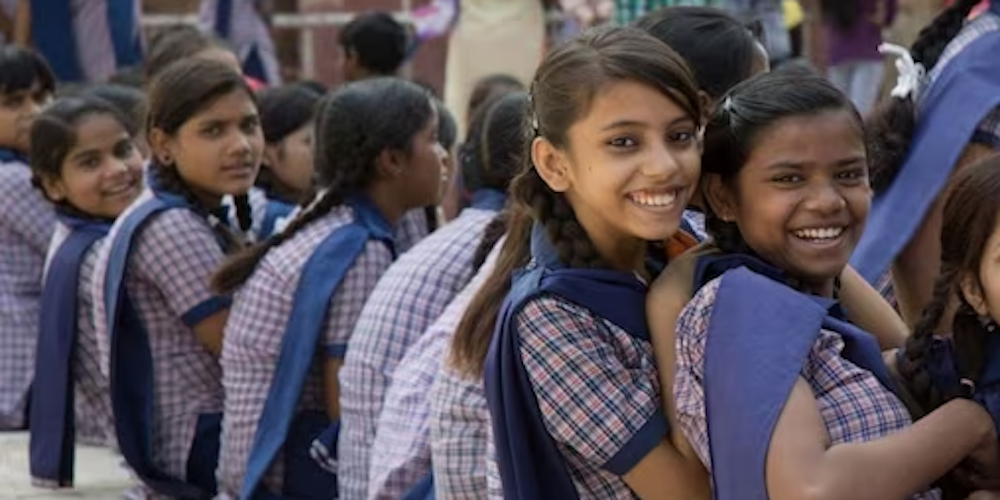Ensuring Menstrual Hygiene for Girls in Schools

The Supreme Court of India has just directed the Union Government to devise a uniform policy to ensure menstrual hygiene for school children. The policy should ensure all government, government-aided and residential schools provide adolescent students with free sanitary napkins and access to a vending and disposal mechanism, a Supreme Court Bench has said. Schools should also be equipped with separate washrooms for girl students, it has also stressed.
Terming the issue as of “immense importance”, the bench of Chief Justice DY Chandrachud and Justices PS Narasimha and JB Pardiwala has appointed the Secretary of Ministry of Health and Family Welfare (MOHFW) as the nodal officer to coordinate with all the states and UTs and collect relevant data for formulating a national policy. The bench noted that MoHFW, Ministry of Education and Ministry of Jal Shakti have schemes running on the issue of menstrual hygiene.
“At the present stage, we are of the considered view that Centre should engage with all the stakeholders for implementation of the uniform national policy with a leeway for the states and UTs to modify the scheme as per their local needs,” the Apex Court said.
The bench said keeping in mind the implementation of the scheme, all the states and UTs are directed to submit their menstrual hygiene management strategies and plans which are being executed either with the help of funds provided by central government or their own, to the Mission Steering Group (MSG) of the National Health Mission (NHM). It said the mission steering group can re-evaluate the national guidelines based on experiential learning of the last 10 plus years.
The bench said, “All states and UTs are directed to notify the appropriate ratio of girls’ toilets for residential and non-residential schools in their respective territories”. It added that all the states and UTs are directed to make provision for ensuring availability of quality low-cost sanitary pads, vending machines in schools.
“All states and UTs are further directed to ensure that disposal mechanisms are available for schools/school complexes having girls’ enrolment in upper-primary/ secondary/higher secondary classes for safe disposal of sanitary pads.” it said.
The bench directed the Centre to file an updated status report by the end of July, 2023.
Incidentally, Additional Solicitor General Aishwarya Bhati, appearing for the Central government, had pointed out that there are several guidelines and schemes of different ministries dedicated to improve access to menstrual hygiene for young and adolescent girls but the responsibility of providing health care services lies with the respective state governments as public health is a state subject.
Of course, it is a fact that many young school girls struggle with managing their menstruation days. Schools lack proper sanitation facilities and access to sanitary pads. This leads them to miss school several days every month, causing them to fall behind in their studies. The importance of menstrual hygiene for girls in schools cannot be overstated. It is crucial to ensure that girls succeed and achieve their dreams.
In a 2019 study, the World Health Organisation (WHO) discovered that almost half of the schools across the world did not have enough handwashing facilities. When considering the least developed countries, this percentage rose to 70 percent. Furthermore, the taboo and shame surrounding menstruation can affect girls’ self-esteem and confidence.
Schools play a crucial role in promoting menstrual health and hygiene among girls. Menstruation is a natural process that affects half of the world’s population, but there is still little awareness about it.
Schools can help break down the knowledge barriers by providing comprehensive menstrual education. Education that covers topics such as the menstrual cycle, hygiene practices, and menstrual product options. This can help girls understand their bodies better and promote better hygiene practices, such as using sanitary pads in India, which can reduce the risk of infections and other health complications.
In addition to education, schools can also provide access to menstrual products, including sanitary pads for schools. Special mention should be made of differently-abled girls in India who face barriers to accessing menstrual products. This can lead to missed school days and reduced academic performance. By providing sanitary pads for schools, schools can ensure that girls have access to essential menstrual products and do not miss school due to their menstruation.
Furthermore, schools can create safe and supportive environments for girls during menstruation. This can include the provision of private and hygienic restroom facilities, adequate disposal facilities for menstrual products, and access to clean water for washing hands and menstrual products. Schools can also train teachers and staff to be supportive of girls during their periods and create an environment where menstruation is normalised and not stigmatised.



